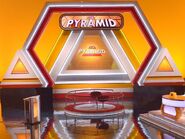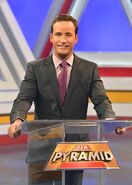| Aired | |
| GSN, September 3 - October 26, 2012 | |
| Number of episodes | |
| 40 (2 unaired) | |
| Run time | |
| 30 Minutes | |
| Host | |
| Mike Richards | |
| Announcer | |
| JD Roberto | |
| Origination | |
| Sony Pictures Studios, Culver City, California | |
This is chronicling the 2012 version of Pyramid (better known as The Pyramid), produced by Embassy Row.
Game Format[]
Main Game[]
Two teams, each consisting of a celebrity guest and a studio contestant, attempted to guess a series of items relating to different categories within a short time limit based on clues given by their partners.
The game consists of six categories, each one cleverly written in order to give team members a vague idea of what it was about (ex: "Loosen Up" - things that are stiff; "Made Public" - things that are used by the public; "The Woodsman" - things that a carpenter uses). Some categories also involved famous people, which contestants and celebrities both dreaded. Each team played each category in alternating order (their choice), and for each category, one person on the team had 30 seconds to describe seven items relating to that category to their partner. Teams scored 1 point for each correct answer (for a maximum of 7 points); if they passed on a word, they could come back to it. Should a team get seven out of seven in any turn, the contestant wins $500. The clue giver could use voice inflections and hand/body movements while describing a word, but they could not say the actual word or any other part of it or else they would lose out on that potential point score (accompanied by a "cuckoo" sound effect). For the first two categories, the celebrities gave the clues, then the contestants gave the clues for the next two, and then for the final two, teams decided amongst themselves who would give or receive clues (the team that was trailing usually got first pick between the last two categories). The team in the lead after the sixth category moved on to the Winner's Circle.
Tie-Breakers[]
If the game ended in a tie, the game shifted into a tie-breaker situation. The team that caused the tie had a choice between two letters leaving the other for the other team. Both teams had 30 seconds to get as many items beginning with their letter(s) as they can. The team that got the most won the game.
Winner's Circle[]
The Winner's Circle was still played the same way as before: one member of the winning team had 60 seconds to describe six categories of increasing difficulty to their partner by listing items relating to each category. Contestants always had the option of whether they wanted to give or receive clues in the Winner's Circle, but celebrities usually gave the majority of the time. Regardless of who gave the clues, there were strict rules involving the types of clues players could not give in the Winner's Circle (see below):
- Clue givers could not use their hands (their chair had special straps attached to the arms to prevent them from doing so)
- Clue givers could not give away any part of the category itself or the essence thereof
- Clue givers had to use a short and concise list of clues; they could not use clues that were overly descriptive
- Clue givers could not use synonyms or prepositional phrases
- Clue givers' clues had to relate to the category itself
If the clue giver gave an illegal clue at any time, the category in play was thrown out, thus disqualifying the contestant from winning the grand prize. However, if this happened with time left on the clock and with unrevealed categories yet to be played, then the team was allowed to play the remainder of the Winner's Circle until time ran out or until the remaining categories were all correctly guessed. The first category was worth $100, and each subsequent category was worth $100 more up to $500 for the fifth, with the final category worth $750. If the team got all six right before the time expired, then the contestant partner won the grand prize.
The grand prize for each Winner's Circle was determined by how many perfect rounds a contestant played in the front game; the base amount was $10,000, with $5,000 added for each 7/7. Playing a perfect game meant the Winner's Circle was worth $25,000.
Trivia[]
The $500 bonus for getting "seven out of seven" rule was borrowed from the unsold 2000 revival of The $100,000 Pyramid and the unsold 1997 reboot of Pyramid.
Episodes[]
See also: The Pyramid (2012)/Episode Guide
Merchandise[]
Photos[]
Press[]
Video[]
See Also[]
The $10,000 Pyramid
The $20,000 Pyramid
The $25,000 Pyramid
The $25,000 Pyramid (1982)
The $25,000 Pyramid (2010)
The $50,000 Pyramid
The $100,000 Pyramid
The $100,000 Pyramid (1991)
The $100,000 Pyramid (2000)
The $100,000 Pyramid (2016)
The $500,000 Pyramid
The $1,000,000 Pyramid (2000)
The $1,000,000 Pyramid (2009)
Pyramid (1996)
Pyramid (1997)
Pyramid (2002)
Pyramid Rocks
The Junior Pyramid
Junior Partner Pyramid
All-Star Junior Pyramid




